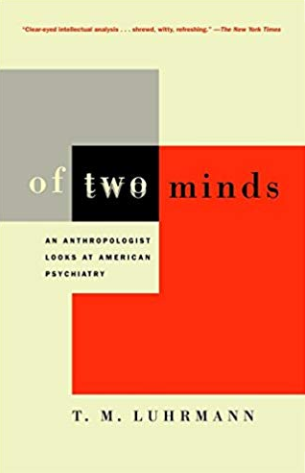Of Two Minds: An Anthropologist Looks at American Psychiatry, by Tanya Luhrmann
As highlighted by the very notion of neurodiversity, autistics’ claim to a specific identity is linked to the cerebralization of their condition. As the anthropologist Tanya Luhrmann shows in her ethnographic account of American psychiatry, the biologization and neurologization of mental illnesses tend to bracket off subjective and experiential dimensions and to convey the positive message that “the body is always morally innocent” (Luhrmann 2000, 8).
As it turns out, it is easier for patients and their relatives to accept a diagnosis of bipolar disorder, which has become associated with brain states, than one of manic depression or manic-depressive disorder (other labels for the same condition), which tend to be perceived as psychological (Montanini and Banzato 2012). In the latter case, “mental illness is in your mind and in your emotional reactions to people. It is your ‘you’” (Luhrmann 2000, 6). In contrast, a cerebral disorder is only connected to the body, in the same sense that a heart attack may affect your mind but “is” in your body.

About the book
With sharp and soulful insight, T. M. Luhrmann examines the world of psychiatry, a profession which today is facing some of its greatest challenges from within and without, as it continues to offer hope to many.
At a time when mood-altering drugs have revolutionized the treatment of the mentally ill and HMO’s are forcing caregivers to take the pharmacological route over the talking cure, Luhrmann places us at the heart of the matter and allows us to see exactly what is at stake. Based on extensive interviews with patients and doctors, as well as investigative fieldwork in residence programs, private psychiatric hospitals, and state hospitals, Luhrmann’s groundbreaking book shows us how psychiatrists develop and how the enormous ambiguities in the field affect its practitioners and patients.
Find the book on Amazon:



























































































































0 comments
Sign in or create a free account